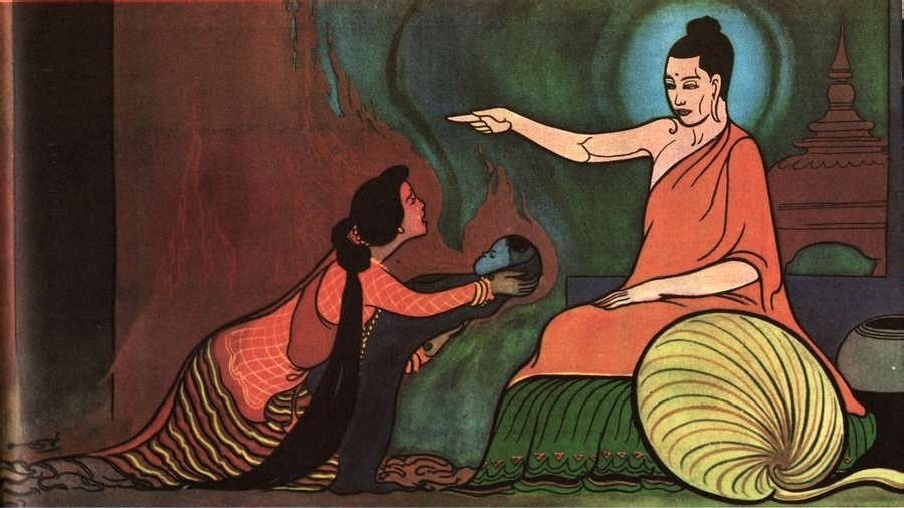
Kisa Gotami’s ghost has long haunted me. It has probably haunted many of us in the field of Buddhist Studies. She is the face of female suffering, of devastated motherhood, of attachment and loss.
For those not familiar with her story, Kisa Gotami is said to have been a woman from a poor family who was married to a wealthy older man. Her husband turned out to be abusive and she suffered greatly under his tyranny. When she finally fulfilled her wifely duties and produced a son, he softened his stance and family life became bearable for a while. Maybe even a bit happy.
But householder-happiness was not to be Kisa Gotami’s fate. Not long after she gave birth, Kisa Gotami’s son died and her world fell apart. She was so devastated that she refused to let her son go—literally. She wandered through her village wailing with her dead son in her arms. One of the neighbors finally intervened and suggested she see the Buddha. He was known to have magical powers. Maybe he could help?
Kisa Gotami raced off to see the Blessed One, and with her dead baby still clutched in her arms, begged for a solution. He promised that he had one: “Go through your village and find a mustard seed from a household that has never known death,” he said. “If you can bring me that mustard seed, I will help you.”
She was elated and bounced away, convinced that her problems were about to disappear. She knocked on the first door and asked for a mustard seed. They had plenty. Unfortunately, someone had also recently died there, so they did not fit the bill. On to the next house she went, knocking on the door with a dead baby in her arms, seeking the magical pill she yearned for, but once again she met with disappointment. They, too, had known death in their home. So did the next house, and the one after that.
We don’t know how long it took Kisa Gotami to realize the Buddha’s teaching, but eventually the point reached her. Death was not personal. It was an inevitability that we must all face. She finally returned to see the Buddha—much calmer this time—and told him that she was ready to let her son go. He ordained her on the spot and she was awakened not long thereafter.

Kisa Gotami’s journey is about love and loss. It is a story about coming to a realization that is difficult for anyone to contend with. But for many feminist scholars of Buddhism, this story also reads as a Buddhist warning: the only way to achieve awakening is to lose your son.
Although this might seem like a radical reading of the narrative, Buddhist literature has many stories that lead to a similar conclusion, to the point that Kisa Gotami reads like the mascot of a long tradition in which motherhood ultimately represents attachment and loss. Freedom comes when motherhood is gone. It is for this reason that for me—as the mother of an only son myself—Kisa Gotami’s ghost can feel haunting at times. Did I relinquish my rights to awakening the day my son was born? Sometimes, it seems as though the Buddhist answer to that question is yes.
Western discourse has not been much kinder where motherhood is concerned. Although I do not have the space to explore the topic here, suffice it to say that Eve’s curse has played its part. One of my most pronounced memories as a child includes seeing the mothers of my family draped in giant dresses to hide the contours of their pregnant bodies. In those days, pregnancy was not something to photograph, much less reveal. It wasn’t deemed particularly beautiful. It was hidden under layers and layers of cloth.
So much has changed since my mother’s days. Pregnancy and motherhood are celebrated in ways that were not conceivable a generation ago. Pregnant women wear tight fitting clothes and maternity leave has become an obvious requirement in most countries around the world. Women in many places are welcomed to become mothers while still being people. They can pursue higher education, run companies, meditate, and breastfeed all at the same time. Of course, the work is not finished, but we have come a long way.
But when I saw Beyoncé’s performance at the Grammy Awards in February, I realized that we were about to be brought even further. (For those who have not seen the clip, it is worth watching before you read further.)
The extraordinary cultural icon that is Beyoncé strutted onto the stage virtually naked (with the exception of a kind of bikini-like costume), covered in golden glitter and a halo crowning her head. She was spectacular and beautiful (as always), and very pregnant. She exposed her belly for the whole world to marvel at.
I don’t know much of anything when it comes to pop culture (my students will happily attest to this fact), but I know a cultural shift when I see one, and that performance was it. Beyoncé stood on that stage and owned her womanhood and her pregnancy with uncompromised glory. She did not cover herself with a tent, or starve herself to be thin. She did not take a backseat because of her “condition,” or hide a changing figure. Instead, she stood on a mountaintop and declared her pregnancy like a goddess, her legs holding her up in towering heels. I watched her performance on my screen with my jaw hanging open. I felt Kisa Gotami was watching Beyoncé with me. The two of us dumbfounded by a possibility neither of us had ever imagined before.
When Kisa Gotami achieved awakening, her world was blown wide open. But before she shaved her head, Buddhist patriarchy held her down. Kisa Gotami never received the support she needed to feel accomplished until motherhood was ripped from her hands in the body of her dead son. She lived in a world and in a personal context that could not see her as a mother and as a person capable of inner freedom at the same time. She was powerless in so many ways. Until, that is, she shaved her head. Then the power was all her own.
But Beyoncé’s power was owned on that stage with and through motherhood—not despite it, and certainly not without it. I obviously know nothing about Beyoncé’s inner life, but as a character on a stage, she held her power with uncompromising dignity. And although she was surely summoning Yoruba deities, she also looked like a pregnant Buddhist goddess to me—an image that does not belong in the Buddhist imaginary, but perhaps should.
As I watched Beyoncé perform, I saw the possibility of woman without limitation. I saw what Kisa Gotami never had the opportunity of encountering while she was still a householder. I saw the magnitude of potential. I saw what I had not seen in my youth, and what Kisa Gotami never had a chance of encountering before she was ordained. Kisa Gotami and I watched Beyoncé together and we were in awe.
Related features from Buddhistdoor Global
The Fiction of the Self: Ruth Ozeki
Tsoknyi Gechak School: A Transformative and Holistic Learning Experience for Young Nuns
Standing Together: Rev. Angel Kyodo Williams’ Radical Dharma – Book Review
An Agent of Change: Empowering Bhutanese Nuns













